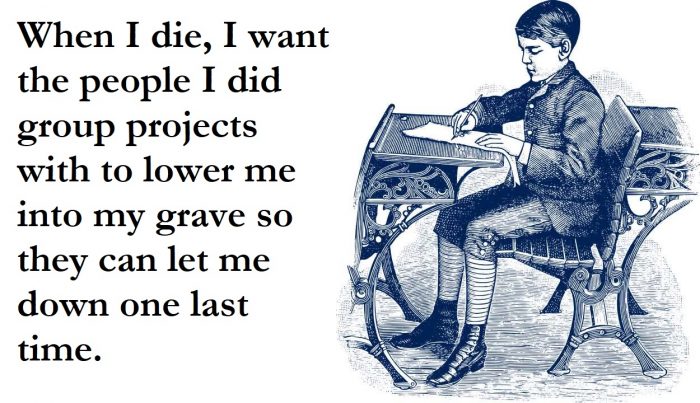What feelings come up in your body when you hear the word “group project?”
If you’re like me, then you will feel instant dread.
Since I can remember, I was the person in the group who came up with the ideas, assigned the roles, and then stayed up the night before the project was due to complete the parts that my group members had failed to do, or had done poorly (by my standards).
If you have had similar experiences, or if you find yourself wondering why those around you constantly look to you to lead, organize, advise, help, and figure things out, then you might be an over-giver.
Over-giving is the tendency to give an amount of time and energy to others that exceeds our capacity to renew that energy.
We condone over-giving as a selfless trait, and even expect it (especially from women). But we often fail to look at what is behind the tendency to over-give. Namely, guilt, insecurity, withheld communications, shame, and/or self-importance.
Through coaching hundreds of people, I have identified these main reasons for over-giving:
Guilt: knowing that others have given more to you than you feel you can ever give back. This is often the case for those who have a parent who shamed them for how lucky they are, or frequently remarked on how much they have had to give up for their child/children.
Insecurity: feeling like the only reason people love or care about you is because of what you do for them, not because of who you are. This is a fear that others will leave you if you stop giving in excess to them.
Withheld communications: feeling as if you are not allowed to, or are unable to ask for what you need so you go overboard to do things for others in an attempt to guilt or silently persuade them to do things for you in return.
Shame: someone has shamed you for being “selfish” in the past and so you over-give to compensate.
Self-importance: believing yourself to be better equipped to handle things and therefore are unwilling to share responsibility with others whom you believe will not be as effective as you.
Most over-giving tendencies are fueled by a composite of many of these reasons.
Hidden behind over-giving is an inauthenticity that needs to be acknowledged: while we pat ourselves on the back for being so generous, we are completely blind to the ego validation that we are getting out of the exchange.
First, by believing that others can’t do their fair share, we are imagining them to be weak and we are making ourselves feel superior.
Another hidden advantage to over-giving is that when we resign ourselves to over-giving, we don’t have to take full responsibility for our own lives.
We breed resentment by creating ourselves to be the victim of other’s needs and can then consciously or unconsciously blame and resent others for our unhappiness or lack of personal success or fulfillment.
Not only is over-giving inauthentic, but it is also entirely ineffective.
One of the reasons we over-give is because we believe that once others see how much we are doing or how generous we are, then they will begin reciprocating.
However, this is a logical fallacy because what really seems to happen is that when people see how willing we are to bend over backward for them, they come to expect it from us.
We create the illusion for them that it’s no big deal, or even that we love giving so much.
Other people can sense that giving fills a void for over-givers, and they subconsciously feel okay about receiving our generosity because they can sense that we are getting something out of it.
So while we keep trying to one-up ourselves with how much we give, they become desensitized to our generosity and come to expect more and more.
It’s a vicious cycle that must be stopped, lest our resentment and burnout continue to amplify.
So how can we stop the momentum of our over-giving?
First, by taking a good look at our ulterior motives and true reasons behind over-giving, and understanding that it is not as altruistic as it seems.
We must get real with ourselves about what we are covering up, pretending, or avoiding, and how we are being manipulative when we over-give, and then we must take full responsibility for that.
This means we must take responsibility for healing the guilt, insecurity, shame, and/or vanity that is at the source of our over-giving tendency.
It means we must start actively communicating our real needs, be willing to request what we need from others, and be willing to apologize for the times when we have inadvertently been manipulative through our over-giving.
It means we need to give up being a victim of being so needed, give up resentment, give up our ego identification with struggle, and give up the validation we get from being so overly “helpful and generous.”
If we are willing to have this level of self-awareness, forgiveness, authenticity, honesty, and self-acceptance, then we can develop the capacity to give to others only when we are truly choosing to give—and we can begin to start receiving generosity in return.
~









Read 1 comment and reply